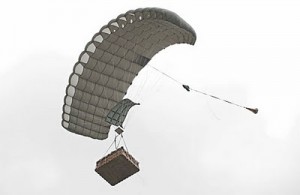The ParaLander ram-air cargo parachute system, developed and produced by Cassidian, has been approved for operational deployment by the Bundeswehr Technical Centre (WTD) 61 in cooperation with Cassidian in Manching. ParaLander was classified as an unmanned aerial vehicle (UAV) following extensive flight testing.
Key Features:
- Fully automatic ram-air parachute system for the safe and pin-point delivery of sensitive loads
- Provision of supplies for operational units in the crisis area
- Approved for deployment in restricted areas, including in peacekeeping flight operations
It is the only commercially available system in the world that can ensure the pin-point delivery of sensitive mission equipment, humanitarian aid and supplies fully automatically from the air without damage. To date the German Armed Forces have procured five ParaLander systems within the scope of immediate operational requirements; these are now to be deployed for missions in Afghanistan. The procurement of additional systems for the German Armed Forces is envisaged.
ParaLander has received Category I certification under UAV regulations and is therefore approved for deployment in restricted areas, including in peacekeeping flight operations. The system is initially intended to carry a 1,000 kg payload, dropped from a C-160 Transall transport aircraft. The medium-term goal is also to be able to deploy the ParaLander over populated areas during operations and from on board the A400M. Depending on the type of aircraft dropping it, the system can be used at altitudes of up to 10,000 metres and over distances of up to 50 kilometres. Cassidian is also working on making ParaLander able to carry payloads of more than five tonnes in the future. The system thus makes a significant contribution to supplying operational units that are cut off from supply routes in the crisis area. In addition, ParaLander improves safety for the aircrew of transport aircraft, as it can be dropped beyond the range of most air-defence systems in crisis regions.
ParaLander consists of a ram-air parachute and the control unit, which are lashed to the payload, and a mission planning system. After the parachute system has been dropped from the aircraft, the control unit steers it and its payload to the target area with the aid of servomotors and GPS. A patented mechanical system, activated by a laser altimeter, ensures that the load’s descent is slowed down in good time shortly before the landing.

